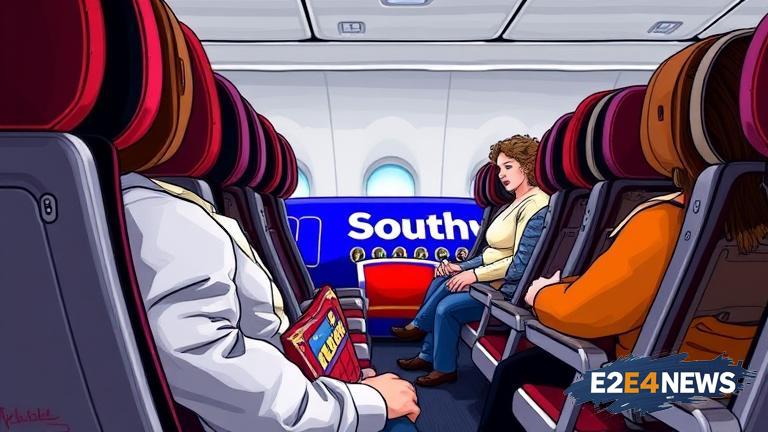Southwest Airlines has recently introduced a new policy that has sparked controversy among its passengers. The policy, which aims to accommodate plus-size passengers, has been met with criticism from many who feel it is unfair and uncomfortable for other travelers. The new policy requires plus-size passengers to purchase an additional seat or pay for a seat with more space. This move has been seen as a way for the airline to increase revenue, but many argue that it is discriminatory and targets a specific group of people. The policy has been criticized for being vague and unclear, leaving many passengers unsure of how it will be enforced. Some have expressed concerns that the policy will lead to embarrassment and humiliation for plus-size passengers, who may be forced to purchase an additional seat or be seated in a specific area. Others have argued that the policy is necessary to ensure the comfort and safety of all passengers. However, many feel that the policy is not a solution to the problem, but rather a way to shift the burden to plus-size passengers. The controversy surrounding the policy has sparked a wider debate about body positivity and acceptance in the airline industry. Many are calling for a more inclusive and accommodating approach, rather than one that targets and stigmatizes a specific group. The policy has also raised questions about the lack of standardization in airline seating, with many arguing that seats should be designed to accommodate a wider range of body types. Some have suggested that airlines should provide more flexible seating options, such as adjustable armrests or more spacious seats. Others have argued that the focus should be on providing better customer service and support, rather than implementing policies that target specific groups. The backlash against Southwest Airlines has been swift, with many taking to social media to express their outrage and disappointment. The airline has faced accusations of being insensitive and discriminatory, and many are calling for a reversal of the policy. In response to the criticism, Southwest Airlines has released a statement defending the policy, citing safety and comfort concerns. However, many remain unconvinced, and the controversy is likely to continue. The debate surrounding the policy has highlighted the need for greater awareness and understanding of the issues faced by plus-size passengers. It has also sparked a wider conversation about the importance of inclusivity and acceptance in the airline industry. As the controversy continues to unfold, it remains to be seen how Southwest Airlines will respond to the criticism and whether the policy will be revised or reversed. In the meantime, many are left wondering what this means for the future of air travel and how airlines will balance the needs of all passengers. The policy has also raised questions about the role of airlines in promoting body positivity and acceptance. Some have argued that airlines have a responsibility to provide a welcoming and inclusive environment for all passengers, regardless of their size or shape. Others have suggested that airlines should provide more resources and support for plus-size passengers, such as specialized seating or additional assistance. The controversy surrounding the policy has also highlighted the need for greater standardization in airline seating and policies. Many are calling for a more consistent approach to accommodating plus-size passengers, rather than the current patchwork of policies and procedures. As the debate continues, it is clear that the issue of plus-size passengers and airline policies is complex and multifaceted. It will require a nuanced and thoughtful approach to resolve, one that takes into account the needs and concerns of all passengers. The controversy surrounding Southwest Airlines’ new policy is a reminder that the airline industry has a long way to go in terms of promoting inclusivity and acceptance. However, it also presents an opportunity for airlines to rethink their approach and provide a more welcoming and accommodating environment for all passengers.




